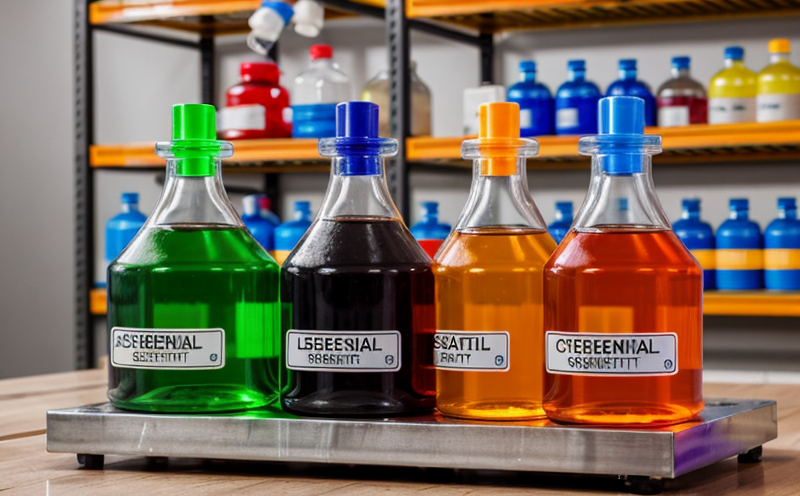DEHP Phthalate Testing in Consumer Products
The detection and quantification of DEHP (Diisononyl Phthalate) phthalates in consumer products is critical due to its classification as a harmful substance under various international regulations. DEHP, an industrial chemical used in plasticizers, has been linked to numerous health risks including reproductive toxicity and developmental disorders when present at certain levels.
Consumer product manufacturers are required to adhere to strict standards set by the European Union's Restriction of Hazardous Substances Directive (RoHS), California Proposition 65, and other national and international regulations. The primary goal is to protect public health from exposure to harmful substances while ensuring that products meet safety and quality standards.
Our DEHP phthalate testing service employs advanced analytical techniques such as Gas Chromatography-Mass Spectrometry (GC-MS) for precise quantification of DEHP in various consumer goods. This includes textiles, toys, electronics, personal care items, and household products. The test method strictly follows ISO 8157:2013 which provides a standardized approach to determining the concentration levels of phthalates.
Preparation involves thorough sampling of the product under test for homogeneity, followed by extraction using solvents like dichloromethane. The extracted samples are then subjected to GC-MS analysis where DEHP is identified based on its unique mass spectrum signature. Reporting includes detailed results with comparison against allowable limits and recommendations for compliance.
Understanding the impact of this testing extends beyond mere regulatory adherence; it contributes significantly towards brand reputation management by demonstrating commitment to consumer safety. By ensuring no detectable levels of harmful substances, companies can enhance trust among customers who value health and environmental sustainability.
In conclusion, rigorous DEHP phthalate testing ensures that products comply with stringent international standards safeguarding public health. This service not only helps meet regulatory requirements but also plays a crucial role in maintaining consumer confidence through responsible manufacturing practices.
Why Choose This Test
The decision to conduct DEHP phthalate testing is driven by several compelling reasons that align with both ethical and commercial considerations:
- Regulatory Compliance: Adherence to RoHS, Proposition 65, and other national and international standards is essential for any business operating in the consumer products sector. Non-compliance can lead to severe legal penalties.
- Health & Safety: Protecting consumers from potentially harmful chemicals like DEHP is paramount. This not only contributes positively towards public health but also reduces the risk of product recalls and associated costs.
- Brand Reputation: A reputation for quality and safety enhances customer loyalty and market share. Demonstrating compliance through transparent testing adds value to your brand.
- Economic Benefits: Early identification and correction of non-compliant products can save substantial financial resources compared to rectifying issues post-market release.
- Sustainability: Ensuring that products meet stringent environmental standards aligns with broader sustainability goals, appealing to eco-conscious consumers.
In summary, choosing DEHP phthalate testing is a strategic move towards maintaining high ethical standards and enhancing business resilience in the face of ever-evolving regulations and consumer expectations.
Customer Impact and Satisfaction
The outcomes of conducting DEHP phthalate tests have far-reaching impacts on customer satisfaction and trust:
- Increased Trust: Consumers are more likely to purchase products from brands that demonstrate a commitment to safety. Transparent communication about test results can significantly boost consumer confidence.
- Enhanced Reputation: Consistently meeting regulatory requirements positions your company as a leader in product safety and quality, which is particularly important for luxury or premium brands.
- Better Decision-Making: By providing comprehensive testing reports, you empower customers to make informed choices about the products they buy. This can lead to increased customer loyalty and repeat business.
- Compliance Assurance: Demonstrating compliance helps eliminate the risk of legal challenges or reputational damage due to non-compliance issues.
Furthermore, the results from these tests offer valuable insights into potential areas for improvement within your supply chain management processes. These insights can be used to implement corrective actions and continuous quality improvements, ultimately leading to more robust product offerings.
International Acceptance and Recognition
The significance of DEHP phthalate testing extends globally as it aligns with widely recognized standards and regulations:
- RoHS Directive: The European Union's RoHS directive aims to reduce the use of hazardous substances in electrical and electronic equipment, including those containing DEHP.
- California Proposition 65: This initiative mandates that products sold in California must not expose consumers to levels of DEHP exceeding specified limits as determined by this legislation.
- EN 71-3: Specific guidelines provided under EN 71-3 outline the permissible concentrations of phthalates, including DEHP, in toys and similar objects intended for use by children aged up to 14 years old.
- ASTM F963: This American standard specifies requirements covering material composition, flammability, electrical hazards, mechanical strength, and other aspects related to toy safety. Compliance with ASTM F963 includes meeting phthalate limits set out in the standard.
The acceptance of DEHP testing results across different markets underscores their importance not just domestically but internationally as well. Laboratories adhering to these standards ensure that their findings are universally recognized and accepted, facilitating smoother trade between countries.





